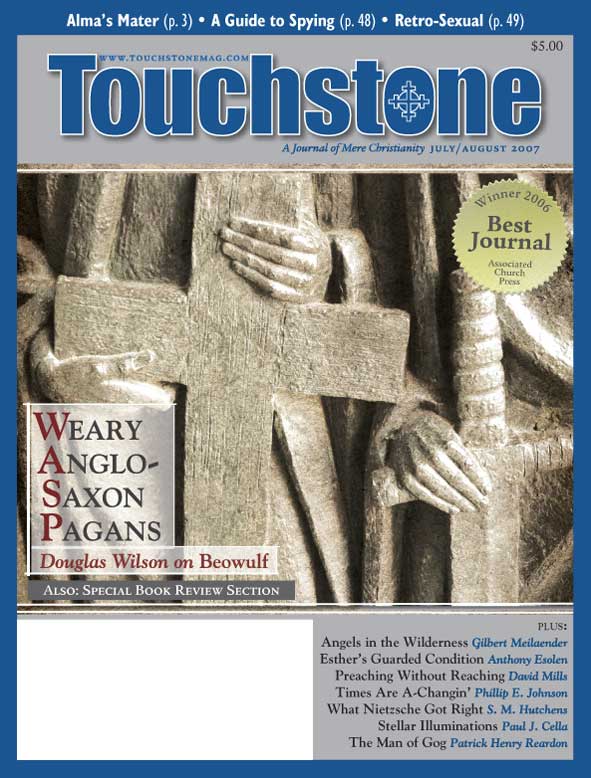Cosmic Grandeur
A Meaningful World: How the Arts and Sciences Reveal the Genius of Nature
by
Benjamin Wiker and Jonathan Witt
InterVarsity Press, 2006
(257 pages, $18.00, paperback)
reviewed by Jay W. Richards
One of the popular criticisms of the intelligent design movement is that it doesn’t produce anything new. Critics claim that advocates of design fixate on a few mysterious parts of nature that science hasn’t fully explained yet, rather than seeking to explain nature in its fullness. A Meaningful World sends this claim packing, and while doing so offers a compelling rebuttal to modern materialism and its reductionistic view of nature.
Benjamin Wiker lectures in theology and science at the Franciscan University of Steubenville. Jonathan Witt was for years a professor of English and is now a research fellow and colleague of mine at the Acton Institute (he was not a colleague when this review was commissioned). Both are also fellows of the Discovery Institute, the institutional home of the intelligent design movement.
Design Genius
As a team, they bring together knowledge of fields as diverse as chemistry and modern literary criticism. This allows them to extend the reach of contemporary design arguments, which have been limited mostly to the machine-like characteristics of nature, which point to a generic intelligence. They draw not just on the minimal definition of intelligence—the ability to choose between competing alternatives for some purpose—but on a sophisticated analysis of the elements of genius.
They begin by focusing on the works of one literary genius, William Shakespeare, especially Hamlet and The Tempest. Shakespeare knew when to conform to the rules of grammar and meaning and meter, but he also knew just when to break them in service of higher rules that befuddle the pedant. His work consistently displays not just technical excellence and intelligence, but what Wiker and Witt identify as the elements of genius: depth, clarity, harmony, and elegance.
First, there is depth: Shakespeare’s works have layers of meanings that one can spend a lifetime descending, without ever reaching the bottom. The reader senses that he is discovering new meanings in Shakespeare, not imposing them on the text.
At the same time, his works exhibit clarity. His plays were accessible to the illiterate masses in Elizabethan England, and are still accessible to modern readers who are willing to concentrate. But clarity is more than simply precision.
Wiker and Witt illustrate this point by comparing Miranda’s speech in The Tempest with a pedantic paraphrase. First Shakespeare: “If by your art, my dearest father, you have/ Put the wild waters in this roar, allay them.”
Now the translation: “If you caused this storm, father, stop it!” It may be hard to describe the difference between these two, but we recognize genius in the former but not the latter.
Jay W. Richards is vice president and senior fellow of the Discovery Institute in Seattle. He is the author most recently of The Untamed God (InterVarsity, 2003) and co-author with astronomer Guillermo Gonzalez of The Privileged Planet: How Our Place in the Cosmos Is Designed for Discovery (Regnery, 2004).
subscription options
Order
Print/Online Subscription

Get six issues (one year) of Touchstone PLUS full online access including pdf downloads for only $39.95. That's only $3.34 per month!
Order
Online Only
Subscription

Get a one-year full-access subscription to the Touchstone online archives for only $19.95. That's only $1.66 per month!
bulk subscriptions
Order Touchstone subscriptions in bulk and save $10 per sub! Each subscription includes 6 issues of Touchstone plus full online access to touchstonemag.com—including archives, videos, and pdf downloads of recent issues for only $29.95 each! Great for churches or study groups.
Transactions will be processed on a secure server.
more on science from the online archives
more from the online archives
calling all readers
Please Donate
"There are magazines worth reading but few worth saving . . . Touchstone is just such a magazine."
—Alice von Hildebrand
"Here we do not concede one square millimeter of territory to falsehood, folly, contemporary sentimentality, or fashion. We speak the truth, and let God be our judge. . . . Touchstone is the one committedly Christian conservative journal."
—Anthony Esolen, Touchstone senior editor













